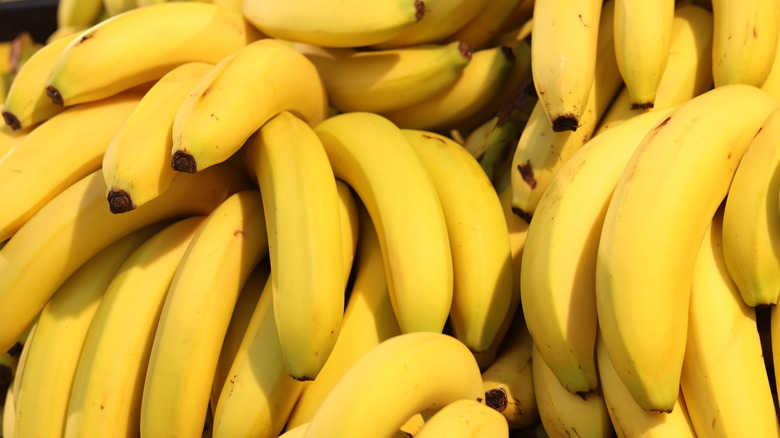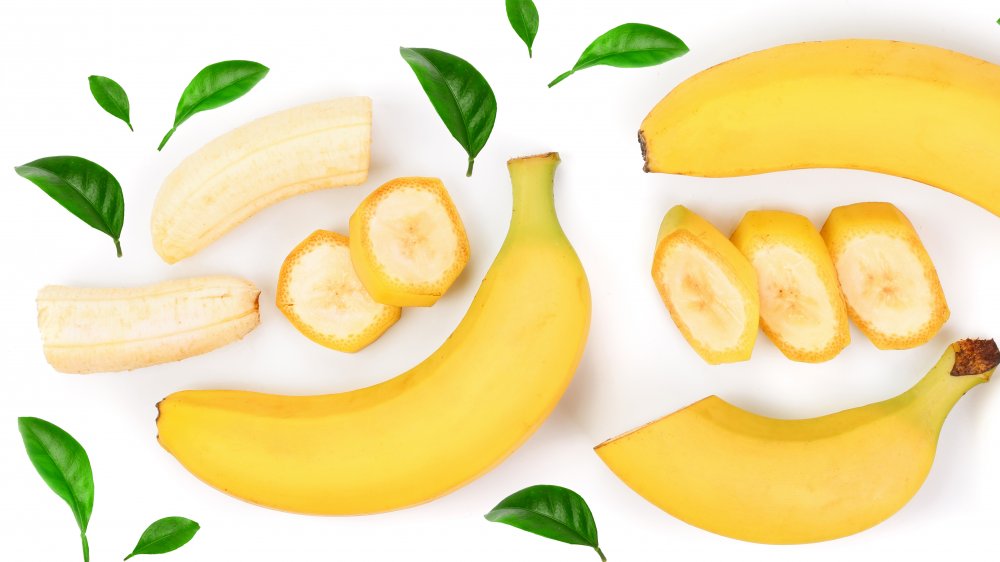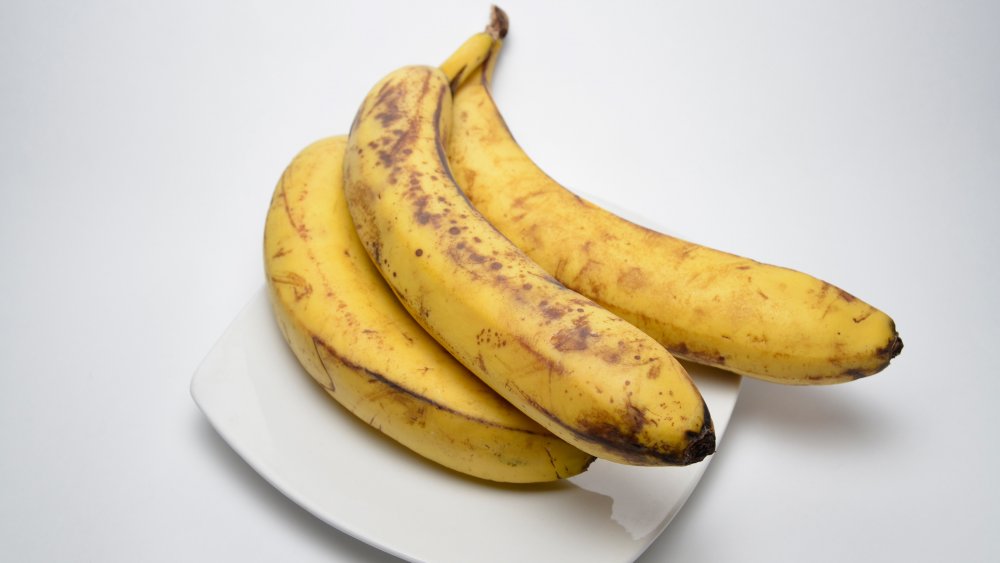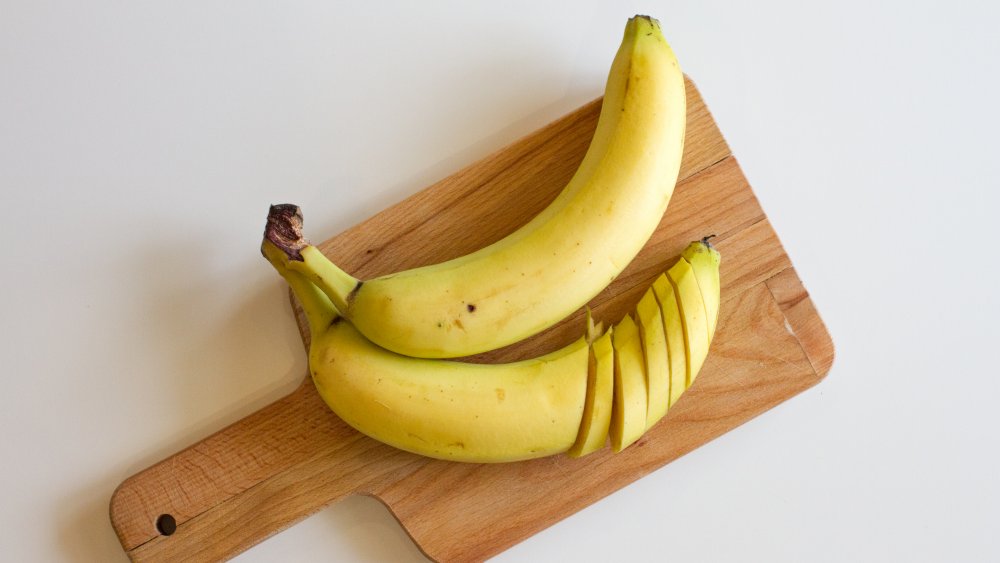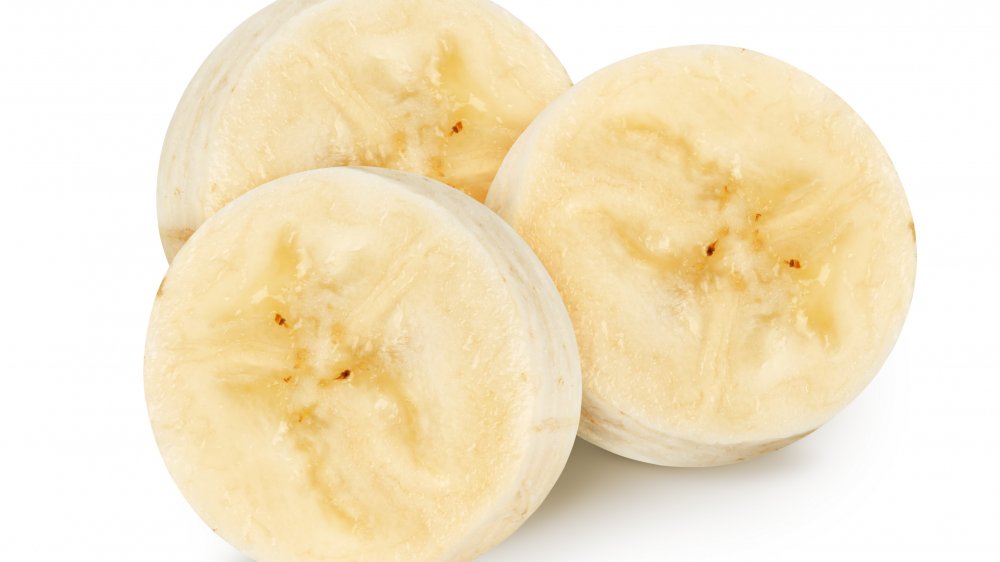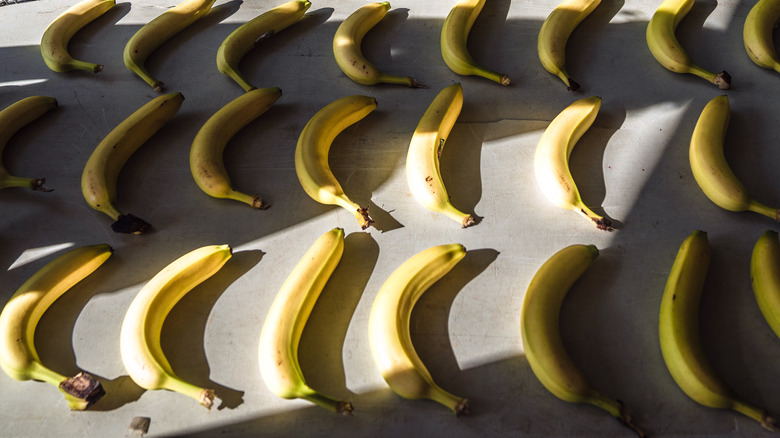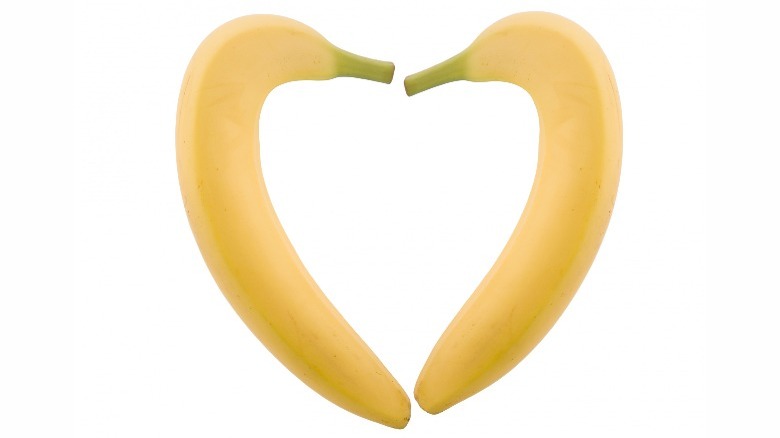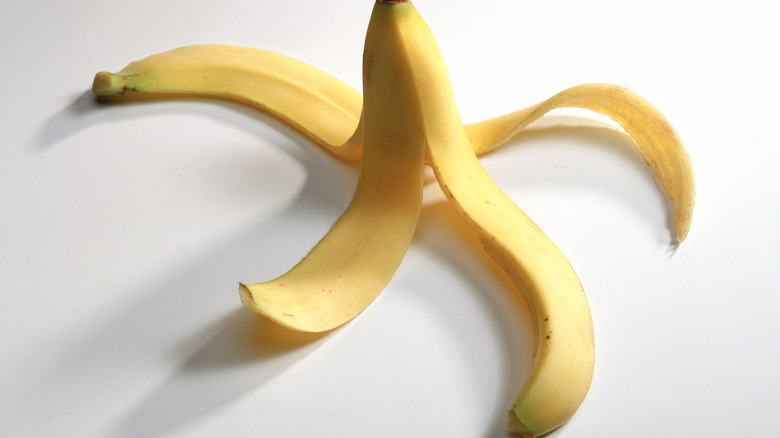Here's What Happens When You Eat A Banana Every Day
While bananas come in a variety of shapes and sizes, from miniature finger-sized ones to giant plantain-esque bananas, the Cavendish banana is the most widely available version in the United States (via The Spruce Eats). Given how common they are, for simplicity's sake, assume that we're talking about Cavendish bananas in this rundown.
As the best-selling item at Walmart, bananas are likely to be the most common fruit in American households (via Business Insider). Luckily, they're a nutritious and beneficial fruit that contains a good deal more than just vitamins and minerals (via Healthline). This, coupled with the fact that they're phenomenally easy to pack in a bag or a lunchbox, makes them a popular snack or lunch item.
There are likely a sizable number of people who consume bananas on a daily basis given their versatility (sliced into cereal, puréed in a smoothie, or enjoyed with peanut butter). Here's what happens if you eat a banana every day.
You can cut down on the number of cramps you get
Muscle cramps, or charley horses as they're popularly known, are one of the most unpleasant side effects of working out. Of course, because life isn't fair, these pesky and painful events can happen even when you're not breaking a sweat, and sometimes occur if you're just watching television or walking from one side of the room to the other.
Cramps can be due to dehydration or a lack of nutrients. Nutrients which have been linked to alleviating muscle cramps are potassium, calcium, sodium, and magnesium (via WebMD). Bananas contain three of these four nutrients, lacking only sodium. While a banana contains 9% of your recommended daily intake of potassium and 8% of your recommended daily intake of magnesium, they only contain about 1% of the recommended daily intake of calcium, so while it may help in preventing the occasional cramp, you should be sure to look to other sources when it comes to getting the rest of the calcium you need in your diet.
You'll be full of energy
Because bananas boast three naturally occurring sugars — fructose, glucose, and sucrose — they are a common choice for athletes and others looking for a quick boost of energy (via Health Xchange). All three of these natural sugars contain the same calories, but the body processes them differently. Fructose and glucose are absorbed into the bloodstream directly, while sucrose has to first be broken down by the body. This means that fructose and glucose will provide you with immediate energy, while sucrose will provide energy over a short period of time (via Healthline).
However, it's not just natural sugars that provide the boost. The banana's vitamin B6 also helps in providing the energy (via Healthline). In fact, a study found that consuming a banana before a 75-kilometer bike race had the same effect as drinking a carbohydrate energy drink for an athlete's performance and stamina.
They can be helpful if you're trying to lose weight
Because bananas tend to have only about 100 calories and a minuscule amount of fat, they are a great option if you're trying to cut down on pounds. Not only does this peel-and-eat fruit provide essential nutrients, but it also contains substances that will help you feel fuller for longer — so that you aren't tempted to start eating something else immediately afterwards.
Bananas that still have a bit of green to them contain what is called resistant starch, an indigestible carb that works the same way in the body that soluble fiber does. Unripe bananas also contain pectin, which is a fiber-like substance. Some people like that chlorophyll taste which is so prominent in green-yellow bananas, but if not, riper bananas also have soluble fiber in them.
Your blood sugar levels will be kept under control
Bananas have a low-to-medium glycemic index ranking, which is a scale that determines how quickly a food increases your blood sugar levels.
The lower the number (55 or lower is considered low) means that the food in question is digested and absorbed slower, which leads to a more gradual and less immediate rise in blood sugar and insulin levels (via the University of Sydney). Over time, blood sugar spikes, as they're known, can lead to a hardening and narrowing of the blood vessels which can ultimately result in a heart attack or stroke (via Healthline). Uncontrolled blood sugar spikes over the long-term can also cause the body to become unable to lower blood sugar on its own, otherwise known as type 2 diabetes.
The glycemic index of bananas are around 30 when they're unripe, and 60 when they are ripe. On average, the value is 51. As a result, bananas won't cause your blood sugar to spike.
Your blood pressure may be better regulated
Outside of cartoons, the idea of a person's boiling point isn't meant to be taken literally. But that doesn't mean the phrase is unworthy of its place in the public lexicon, particularly as a metaphor for one's pounding blood pressure. Now, a rise in blood pressure under stress is normal (via Mayo Clinic). But if your blood pressure is consistently elevated, you may want to consider eating a banana every day — since your blood pressure could be easier to manage if you do (via American Heart Association).
The main reason a daily banana could help regulate a person's blood pressure is the potassium found in each one. Since a higher daily potassium intake has been shown to reduce one's blood pressure, according to Harvard Medical School — and each piece of fruit contains an average of 326 milligrams of potassium – eating a banana offers a substantial boost of the important mineral.
Obviously, there's no guarantee that a banana a day will keep your blood pressure at bay. But since high blood pressure increases a person's risk of both heart attack and stroke (via CDC), it's worth incorporating the yellow-peeled treat into your daily diet.
Your risk of developing certain cancers could decrease
In 2022, an average of 1,670 people were projected to die every day from cancer, according to the American Cancer Society. In other words, since the gothic specter of developing cancer looms over us all, any dietary advantages we can give ourselves is worth incorporating. With this in mind, consider going bananas and eating the fruit every day, since doing so may decrease your risk of developing certain cancers.
According to a 2004 study, children who regularly consumed bananas during their first two years were less likely to develop leukemia — perhaps owing to the fruit's potassium and vitamin C levels. Additionally, bananas contain lectin — a plant-derived protein (via Harvard School of Public Health) — which has been shown to potentially inhibit the growth of cancerous cells, according to a 2014 study.
The high level of antioxidants found in bananas (via Live Science) could also contribute to its possible anti-cancer properties. It's actually unclear whether antioxidants directly reduce a person's risk for developing cancer. But since they're known to neutralize free radicals, there's a chance that at least some correlation exists between antioxidant intake and a reduced cancer risk.
The overall health and functionality of your heart could improve
If you ask a bodybuilder which muscle is the most important in the human body, they might tell you the biceps or trapezius. But for those of us who don't depend on perfectly developed bulging muscles for competitive purposes, there's an obvious choice: the heart. Frankly, no muscle works harder than the heart, according to the Library of Congress, which has the ability to surpass 3 billion beats during a person's life. Consequently, taking genuine care of your heart is key to a long and healthy life — which is one reason to consider eating a banana every day.
The potassium found in bananas is the biggest boon for your heart's overall performance. After all, "potassium is a mineral that is vital for heart health," as associate professor of medical dietetics at Ohio State University, Colleen Spees, told the American Heart Association in 2022. Since an increase in potassium intake is known to lower a person's risk for heart disease (via Harvard Medical School), prioritizing the daily consumption of a fruit loaded with the mineral can work wonders.
A single banana contains roughly 326 milligrams of potassium, according to USDA. So while a banana a day won't single-handedly protect your heart, it does provide a solid serving of potassium — and a slight bit of potential cardiac protection for those who eat the fruit every day.
Bananas can boost your brain health and improve cognitive abilities
The term brain food seems to get tossed around with a sort of reckless abandon in the 21st century. Frankly, trying to decipher which foods provide a legitimate nutritional bounty for the brain can be downright overwhelming to the average consumer. Luckily, certain foods are indeed worthy of the brain food designation, particularly those whole, natural food items chock full of nutrients — such as the humble banana.
The brain's energy is largely derived from glucose — and since "bananas are packed full [of] it," as certified dietician Rebecca Gawthorne told University of Wollongong, the fruit provides an easy burst of fuel for the brain. Additionally, bananas are an excellent source of vitamin B6 as well (via Harvard School of Public Health), which may help improve a person's cognitive functionality.
One 1996 study found individuals with greater vitamin B6 levels in their body demonstrated stronger memory skills than those with lower levels (via SFGate). And, according to NPR, a 2011 study found a reduced risk of brain shrinkage in elderly folks who consumed a high number of vitamin B-rich foods. Frankly then, while a banana a day won't transform you into the next Albert Einstein, it just may boost your brain's overall performance.
Your digestive health could improve
Many folks struggle to ingest the necessary amount of dietary fiber each day, just as they do with any number of essential dietary components. This is a problem, of course, since dietary fiber is absolutely vital to maintaining consistent, healthy, and comfortable bowel movements. And since each banana contains a solid amount of dietary fiber — about three grams in a medium-sized banana, according to SFGate — it's not exactly a mystery why eating a banana daily can improve your digestive health.
Actually, there's more to the banana's digestive powers beyond simple fiber content. According to Harvard School of Public Health, the digestion-resistant starch found in less-ripened bananas can promote gut healing in those with stomach ailments. And, according to a 2012 study, a diet rich in bananas has been shown to improve symptoms for those afflicted with irritable bowel syndrome.
A 2020 study also found bananas can help promote the growth of probiotic bacteria in the body — or so-called good bacteria that aids in gut health (via Cleveland Clinic). In other words, there's a plethora of reasons why eating a banana every day can improve your digestive health and very few reasons not to eat the fruit.
Bananas can help boost your immune system
A properly functioning immune system is undeniably important to living a long and happy life, but that doesn't mean we're in constant consideration of our body's ability to fight off infection. Frankly, unless we're actively sick, many of us tend to neglect our body's protective system during our day-to-day lives. Of course, when we are attacked by some sort of foreign substance, we want to ensure our immune system is ready to go. And if you eat a banana every day, you can increase the odds your body's protective system kicks into gear when needed.
While the precise mechanisms that allow bananas to potentially boost your immune system aren't entirely clear, there are several solid reasons to believe the fruit can help strengthen it. After all, according to SFGate, a number of nutrients found in bananas are known to play important roles in the maintenance of the immune system, including vitamin B6, vitamin C, copper, and folate.
In a lot of ways, our immune system is like insurance. You may not always need it, but when you do, you're glad it's there. Eating a banana every day doesn't guarantee your immune system will operate at its peak performance — but, then again, nothing else in life is guaranteed, either.
Your bone density could increase
For those of you who've never broken a bone (feel free to knock on wood if you're in that group), it's hard to imagine the excruciating agony spawned by a snapped limb. Of course, if you have experienced a bone breaking in two (or more) pieces, you're undoubtedly motivated to avoid that pain at all costs in the future. Either way, if you're eager to ensure your bones remain healthy and strong over the long haul, eating a banana every day can help the cause.
Perhaps the biggest factor in a banana's ability to strengthen your bones is its potassium level. For one thing, potassium itself is known to play a hand in bone health (via Harvard Medical School). Some observational studies have even noted a potential correlation between high-potassium diets (obtained from fruits and vegetables) and greater bone density, according to Harvard School of Public Health.
More than that, though, is potassium's ability to reduce calcium excretion in bones. Since the importance of calcium to bone health is well established, it's logical to include foods in your diet (such as those high in potassium) that help bones maintain their calcium levels. And with an average of 326 milligrams of potassium in each banana, it's clear the fruit may decrease your body's loss of calcium — and increase your overall bone strength.
Bananas may lead to a better night's sleep
It's really difficult to oversell the importance of sleep on the human body; after all, according to HuffPost, we spend one third of our entire life asleep (or in bed trying to sleep, at least). Realistically, then, we don't need to explain why obtaining a consistently sound night's sleep is of monumental importance — or why it's necessary to prioritize foods that help that cause. Thankfully, if you eat a banana every day, you may be able to doze off with less difficulty on a nightly basis.
Several reasons boost banana's stock as a potential bedtime aid, particularly the magnesium and tryptophan found in each piece of fruit, according to Healthline. Magnesium can help regulate a person's circadian rhythm, or the daily wake-sleep cycle that occurs every 24 hours. Since a proper circadian rhythm ensures we feel awake during the day and tired at night, the magnesium in bananas might cause you to fall asleep with less difficulty once your head hits the pillow.
Additionally, a single banana provides a decent amount of tryptophan. Since a 2020 study demonstrated ingesting foods with higher concentrations of tryptophan may lead to "improved sleep outcomes," it's not wrong to conclude a daily banana may, in fact, improve your sleep.
Your chances of developing a chronic lung disease could decrease
If it's not entirely clear by now, the potential health benefits derived from consistently consuming bananas are tremendous. And just as you may boost your heart health by eating the fruit daily, your lungs could be bolstered by bananas too. In fact, when you eat a banana every day, you just might reduce your chances of dealing with pulmonary issues over time.
Since bananas contain a fairly substantial amount of both magnesium and potassium (via Harvard School of Public Health), it's easy to ascertain why the fruit could positively impact your pulmonary system. After all, as a 2002 study published in the American Journal of Epidemiology demonstrated, low dietary potassium and magnesium content results in inferior overall lung function in children.
Additionally, according to Medical News Today, low potassium levels are common in individuals dealing with acute chronic obstructive pulmonary disease (COPD). While there's no clear link between eating bananas and a lower COPD risk, it seems plausible that regularly eating potassium-rich foods (like bananas) could reduce your long-term chances of developing chronic lung disease.
